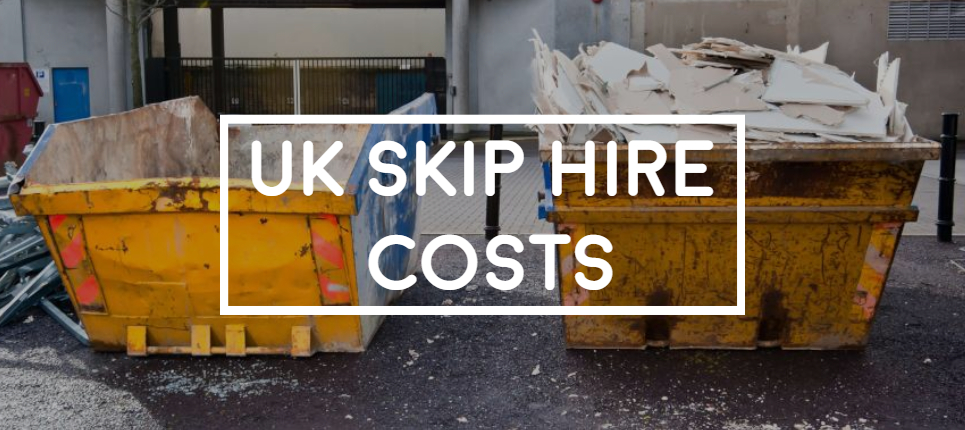Average Skip Hire Prices 2022
Looking for information on average skip hire prices in the UK?
The average price (including VAT) to hire a 6 yard skip is £250 – £300 and for an 8 yard skip it is £270 – £330.
Each year we survey 500 or so skip hire companies from all over the UK. These are not only the skip operators in our own network. We also contact other local suppliers. And we ask them what they charge one off customers to hire a skip. Based on this data, we calculate the average skip hire prices for the the larger cities / most popular Google search areas. These average rates are set out below for a 6 cubic yard and 8 cubic yard skip. These two sizes are often referred to as a ‘Builders skip’ and the most popular sizes hired.
Note that prices exclude the cost of a skip permit or parking bay suspension. This would have to be added if the skip was placed on a public road. The rates are for general mixed waste. Prices for inert waste or wood only skips will differ significantly and also if they are hired for repeat use.
UK Skip Hire Prices 2022 Averages (inc VAT)
| Location | 6-yard skip | 8-yard skip |
| UK Average | £275 | £305 |
| price includes VAT | ||
| Birmingham | £200 | £230 |
| Bournemouth | £275 | £320 |
| Brighton | £240 | £280 |
| Bristol | £245 | £285 |
| Bromley | £250 | £290 |
| Cambridge | £215 | £240 |
| Cardiff | £250 | £270 |
| Chelmsford | £225 | £255 |
| Chester | £210 | £240 |
| Croydon | £275 | £320 |
| Doncaster | £195 | £245 |
| Edinburgh | £185 | £225 |
| Exeter | £275 | £325 |
| Glasgow | £210 | £240 |
| Gloucester | £240 | £280 |
| Hemel Hempstead | £235 | £285 |
| Ipswich | £225 | £255 |
| Iver | £255 | £295 |
| Leeds | £175 | £220 |
| Leicester | £215 | £240 |
| Liverpool | £190 | £225 |
| London | £270 | £295 |
| Luton | £275 | £300 |
| Manchester | £210 | £235 |
| Middlesbrough | £240 | £255 |
| Milton Keynes | £250 | £280 |
| Newcastle | £235 | £270 |
| Northampton | £185 | £210 |
| Norwich | £210 | £235 |
| Nottingham | £195 | £240 |
| Oxford | £260 | £295 |
| Portsmouth | £255 | £295 |
| Reading | £245 | £300 |
| Sheffield | £195 | £230 |
| Southampton | £290 | £340 |
| Swindon | £255 | £315 |
| Tunbridge Wells | £245 | £295 |
| York | £185 | £225 |
Reasons for Skip Price Regional Differences
More generally, the key reasons for regional price differences are 1) local disposal costs and whether there is a nearby landfill site or waste to energy incinerators site 2) strength of local economy 3) competition 4) council bulky waste collection service 5) cost of labour and rent 6) congestion/traffic.
- Disposal cost – skip operators have to dispose of the waste they collect. They take it back to their depot and sort and segregate it. This is knowns as their waste transfer station. Materials can be recycled, sent to waste to energy, or diposed of in a landfill site. Recyclable waste like wood, cardboard, aggregate, soil, bricks, metal has value. The value goes up and down according to demand, which is driven by how much construction is going on the world and what other suppliers of materials are generating. Energy to waste plants charge you to take waste. Landfill sites charge even more, as a result of landfill tax. As well as disposal gate cost, other factors are the transport cost of moving material to these facilities. For example, assume a wood recycling company pays £30 per tonne for wood; it costs a skip operator £30 per tonne to deliver it there and £10 per tonne in people and equipment to segregate out the wood. The resulting net ‘cost’ to the skip company of recycling the wood would be £10 per tonne (ie. £30 less £30 less £10). In cities located a long way from a landfill site or waste to energy plant, the logistical cost of moving it there will be higher. Whereas regions with a facility nearby will pay less.
- Economy – if the local economy is growing fast, this normally means more construction, which in turns means more skips, which leads to higher prices. Greater demand, squeezes supply – so prices rise. On the hand, a very slow local economy, all things being equal, means less demand, excess supply, so lower prices.
- Competitive landscape – greater competition leads to cheaper skip prices. Skip hire is still quite a fragmented industry with limited barriers to entry (apart from the money required to buy the skips and lorries). This should suggest high competition and low prices. But to compensate this, there has been quite a lot of consolidation – ie. one skip company buys other ones nearby. This leads to some much larger, regional operators with limited competition. They can then, because of their size and local influence, increase prices to enjoy better margins. Until that is a newcomer enters the fray and the process starts all over again.
- Council collection service for bulky waste – in areas with particularly good council bulky waste collection service, demand for skips from householders is lower. This in turn helps keep skip prices lower.
- Labour markets & rent – people and property are cheaper in some parts of the UK than others. Skip companies need a property to park their lorries and process the waste. They also employ people to dot he work. Cheaper people and property means cheaper skips, and visa versa in areas where costs are higher. This is one of the key reasons why the North of UK is cheaper than the South.
- Congestion – traffic impacts how long it takes to deliver and collect a skip, which in turns impacts how expensive it is for a skip company to provide a skip. If a skip lorry driver has to spend more time delivering a skip because they’re sitting in traffic all day, then skip prices are higher. This is why hiring a skip for a property in the middle of town often costs a bit more than one in the suburbs.
Maybe try man & van if you’re looking to keep costs down?
Skip hire is generally much more expensive than man & van rubbish collection. To check prices for both skip hire and man & van clearance in your region click here.
Other resources you might be interested in:












